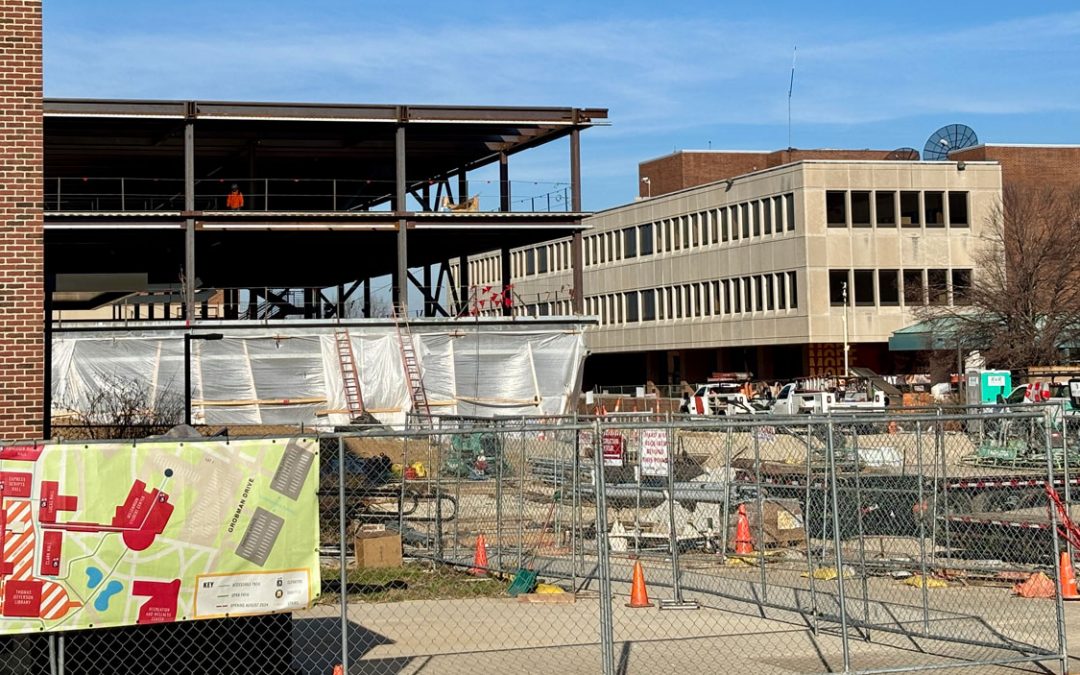
Bettina Casad, an associate professor of psychological sciences, is getting set to conduct her second study exploring British attitudes toward Brexit. (Photo by August Jennewein)
Boris Johnson’s ascension to prime minister of the United Kingdom last month has boosted Brexit – the country’s split with the European Union – back near the top of international news headlines.
Johnson has promised to complete Brexit by Oct. 31, with or without a deal on the terms of its departure. The inability to reach agreement on a deal already forced a March deadline to be pushed back under predecessor Theresa May.
There’s growing concern about the consequences of a no-deal Brexit, only adding to the angst many opponents have felt since the country voted in favor of the referendum to withdraw from the EU by a narrow margin – 51.9 percent of the vote – in 2016.
Bettina Casad, an associate professor in the Department of Psychological Sciences at the University of Missouri–St. Louis, has spent the past few years studying the underlying attitudes that led to Brexit and created so much uncertainty about the U.K.’s future. In the latest installment of the Ask an Expert series, UMSL Daily spoke with Casad about what she’s learned.
What made you interested in Brexit?
I’m a social psychologist, so I study social relationships among groups, and my area of expertise is in stereotyping, prejudice, and discrimination. I had just started studying the EU in 2015. I was looking at it from an intergroup relations perspective in terms of how can all these countries that have different languages, religions, for the most part values, get along and work together?
When Brexit happened, it was shocking. I wondered why they would leave such a great union when they have all these benefits. I decided to do a study, so I got a grant from UMSL Global. I did a survey of people born in England and asked about their attitudes about a lot of issues, but particularly toward immigration. The social psychologists were saying that people in the U.K. wanted to leave the EU because they mainly were tired of all the immigrants coming in. It’s clearly a case of prejudice and discrimination against non-English immigrants, so that piqued my interest to study it from that perspective.
There are also a lot of parallels with what’s going on in the U.K. and the current climate in the U.S. – nationalism, having strong, more insular attitudes rather than globalization, anti-immigrant sentiment. The two leaders are similar. Boris Johnson now being the prime minister has a lot of similar ideologies and values as Donald Trump. It’s just kind of a polar opposite swing from the whole purpose of the EU to create a better union, create jobs, trade and all these opportunities.
When did you do the first study?
We did the first study in 2017, so it was a year after the referendum vote, and we surveyed about 250 people. I have a second study in the works, looking at people’s career outcomes and essentially their worry and uncertainty about their careers because there are five industries that are proposed to get hit the hardest by Brexit. Among them are the finance industry because London is currently the finance capital of Europe. That’s not going to be the case after Brexit.
Also the tourism industry. What’s interesting is most of the people working in tourism are EU citizens but not citizens of the U.K., so it’s kind of unclear what’s going to happen, who’s going to run all the tourism in the U.K. if people who aren’t citizens are expected to leave?
There’s a lot of uncertainty, which – as you’ve seen by the stock market and the value of the pound – that uncertainty doesn’t do well. I think there’s going to be a period where the U.K. has lots of financial issues, though I’m sure they’ll figure it out. It’s just a fascinating time to look at all these issues of economics and attitudes toward other groups. I think economy and immigration were the main reasons that Brexit went through.
Is that what the first study showed in terms of attitudes?
Yes, particularly, people who had high or strong British identity. I measured British identity and European identity, and those tend to be negatively correlated among people in the U.K. The more they identified as British, the less they identified as being European, and that predicted having more negative attitudes about immigrants. Particularly they see immigrants as a threat to their economic well-being. Immigrants are thought to be draining social services budgets, and they also see immigrants as a threat to their values – particularly Muslim immigrants. They are targeted as being different and not being part of British values or religion. If people saw those groups as a threat, they were more likely to support Brexit and vote to leave in the referendum.
How do those perceptions track with what’s really happening in the U.K.?
I’ve been reading some books on Brexit and immigration, and what’s interesting is most of the immigration is EU citizens who immigrate to the U.K. and actually contribute more to the economy than they cost the country in terms of social services. So a lot of the beliefs are unfounded, and it’s just a matter of fear, xenophobia. I think we see that in the U.S. It’s fear of somebody different. The reality is immigrants come, and they open up businesses, and they help the economy. We see that in St. Louis.
There’s a lot of fake news out there and things that scare people, and they react. The political scientists at UMSL can tell you that when people voted on the referendum, many of them had no idea really what the EU was or what the benefits were. So they weren’t making an informed decision.
I understand you had planned to do a post-Brexit analysis earlier this year?
Initially, I was going to look at post-Brexit regret because I have data on how people voted in the referendum, and what predicts that, and I wanted to see now that it happened and people see the economic downfall, do they regret it?
So I worked with a couple of grad students, and what we decided to do instead is to look at economic outlook among younger and middle-aged workers who are in the industries that are most threatened by Brexit. What predicts their well-being in the workplace? What predicts their job satisfaction? What’s their intention to leave the industry?
There’s always a fear that there’ll be a brain drain where people will leave the U.K. to go somewhere else because the opportunities aren’t there. The idea was really to look at economic uncertainty and predictors in those particular industries.
In the data that you collected in 2017, were there any signs of regret?
That’s a good question. I haven’t really looked at that data yet in depth. We looked mainly at the identity and intergroup attitudes in relation to immigration, but we do have data on regret. It was going to kind of partner with the second study to look at regret a year after the referendum and then two or three years after Brexit happened.
I can say people had very strong opinions and were very vocal about why they wanted Brexit. One of the campaigns early on was “Keep Britain British,” and I interpret that as code for “Keep Britain white.” It’s really about who represents British values. The kind of irony is that because England used to be the British Empire and they had all these colonies and then when they decolonized, the former colonial inhabitants can become U.K. citizens, so a lot of their immigrants are from former colonies, like India, for example.
Have you been to the U.K. at all this year?
Yes. I took a group of about 12 students this summer. The course I taught was the Psychology of Intergroup Relations, and we used the theories of the subject to apply to Brexit. We had planned to go post-Brexit to see what happened after that, but they postponed the exit. It was still a very interesting time to be there. While we were there, Theresa May announced her resignation. There were a lot of good news programs covering the issues, and we also went to the parliament in Scotland and visited Belfast, Northern Ireland. When we were in Scotland, their first minister was very adamant about Scottish independence. Scotland is very much against Brexit.
Why do you believe the feelings are so much stronger in England?
That’s a good question, and I’m not certain.
I read a book by former Member of Parliament Dennis MacShane. His book lays out all the reasons why Brexit was inevitable. Looking back on it now, it makes a lot of sense.
The U.K. is an island. It’s not on the main continent of Europe, so they’ve always felt geographically separated. It’s funny, you’ll hear British people say, “Oh, I’m going on holiday in Europe,” and you think, “You’re in Europe.” But they don’t even identify as being part of Europe. The United Kingdom is multiple countries, so they identify as being the United Kingdom. When the European Union was founded, the U.K. never intended to be a member. Winston Churchill played a role, post-World War II, of bringing the EU together but not necessarily wanting the U.K. to be a member.
The U.K. never got on the euro, so they’ve monetarily always been separate. They have different border regulations because they aren’t on the continent.
Another way the U.K. has been separate from Europe is speaking English. On the continent of Europe, everyone speaks some other language. If you look at how many languages Europeans speak, British people are going to probably speak the fewest. Germans are going to learn English when they’re 5 years old, and they know multiple languages. People in every country in Europe learn English to survive. But the British don’t learn German or French or Spanish. So they have this divide.
The other main issue is they want to have more control, more governance. Their Parliament has a really strong tradition, and they don’t like relinquishing any power to the EU governing bodies.














